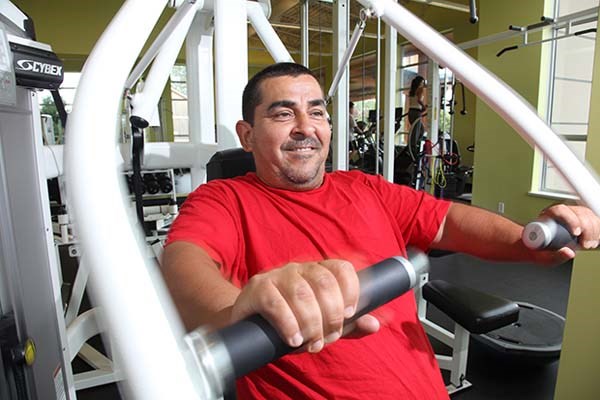It took his nieces to convince Chief Wayne Sparrow of the Musqueam Indian Band to take up the first ever First Nations Health Council Beefy Chiefs and Champions’ challenge.
The Beefy contest, aimed at First Nations leadership, began four months ago and closes Oct. 15. The idea, according to Stó:lo Grand Chief Doug Kelly who is also a spokesperson for the health council, is to get First Nations leaders to take care of themselves both for their own health and as an example for their people.
Sparrow had heard about the challenge but ultimately was motivated by his family to get involved. “My nieces read about it and considered me a little beefy,” said Sparrow. Then his wife “taped my ears back” and he was on his way.
So far, Sparrow has lost 30 pounds. For him the big difference has been watching what he eats. He gave up fast food, salt and even sugar in his coffee. He now eats a lot more salmon. His next goal is to hit the gym and the soccer field. “I’ve got to get cracking,” he said, “I want to win.”
This year the focus is on weight loss with the winner from each region losing the most weight or the most inches. The prizes will be awarded to the winning chief’s community and will remain a secret until the winners are announced during the Gathering Wisdom for a Shared Journey VI conference this fall. The meeting, which starts Oct. 22, will mark the historic transfer of the First Nations and Inuit Health B.C. Region of Health Canada to the First Nations Health Authority, giving First Nations control over and responsibility for health services.
Sparrow said he feels great responsibility as a leader regarding health. “First Nations have a lot of problems with diabetes. I want to lead by example.”
According to the latest Statistics Canada report from 2009 the rate of diabetes is 17.2 per cent for aboriginal people living on reserves compared to five per cent in the non-aboriginal population. For those living off reserves 10.3 per cent have diabetes.
Kelly, who has “astounded himself” by so far losing 67 pounds (starting weight was 333 pounds) by walking and now running, said diseases like diabetes are totally preventable. As part of the new health authority aboriginal leaders “want to do things differently,” he said.
In the past First Nations leaders faced difficulty putting their health on the front burner, said Kelly. “We targeted chiefs because they love their citizens. They give up their lives — their good health becomes a casualty,” he said, noting leaders are constantly on the road, often eating on the run, and work under extreme stress. Their devotion to their people, Kelly said, is also what will keep the chiefs in the challenge motivated for the final push over the next two months.
Kelly said the Beefy chiefs challenge is just the first step in “eradicating health illiteracy” and taking personal responsibility for health and wellness not only among First Nations, but as an example for all Canadians. “Each person is unique, but there is always something you can do.”



